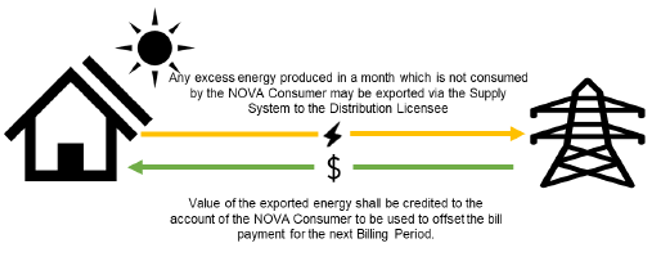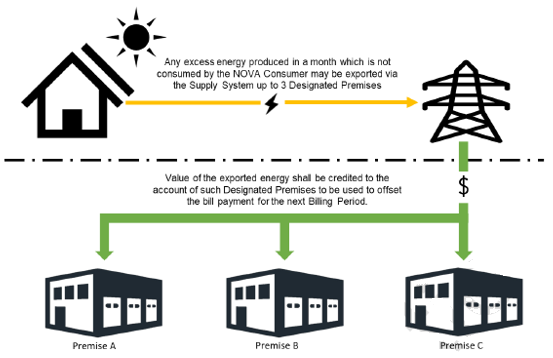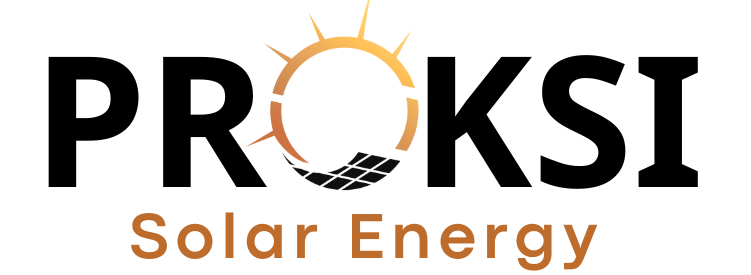NET ENERGY METERING (NEM)3.0
By Sustainable Energy Development Authority (SEDA) Malaysia

The Government has introduced the Net Energy Metering Scheme in November 2016 with a quota allocation of 500 MW up to the year 2020 to encourage Malaysia’s Renewable Energy (RE) uptake. The concept of NEM is that the energy produced from the solar PV installation will be consumed first, and any excess will be exported to TNB at the prevailing displaced cost.
To encourage NEM uptake, the NEM 2.0 was introduced on 1st January 2019, and the true net energy metering concept was adopted, allowing excess solar PV generated energy to be exported back to the grid on a “one-on-one” offset basis. The NEM scheme was executed by the Ministry of Energy and Natural Resources (KeTSA), regulated by the Energy Commission (EC), with Sustainable Energy Development Authority (SEDA) Malaysia as the Implementing Agency (IA). The 500MW quota under the NEM 2.0 has been fully subscribed by 31st December 2020.
Due to the overwhelming response from the PV industry and to boost the usage of Solar energy, the Energy and Natural Resources Minister, via a press statement by KeTSA on 29th December 2020, has introduced the new Net Energy Metering 3.0 programme (NEM 3.0) to provide more opportunities to electricity consumers to install solar PV systems on the roofs of their premises to save on their electricity bill.
According to the media statement released by the YAB Ministry of Energy Transition and Water Transformation (PETRA) on 26th January 2024, the NEM 3.0 program will continue with an additional quota offer of 100MW for NEM Rakyat and 300MW for NOVA. The NEM 3.0 quota offer period will run until 30th June 2025 or until all quotas are allocated, whichever comes first. The NEM 3.0 will be in effect from 2021 to 2025, and the total quota allocation is up to 2500 MW. The NEM 3.0 will be divided into the following three (3) new initiatives/categories:-
| Initiative/Categories | Quota Allocation (MW) | Quota Opening Date |
|---|---|---|
| NEM Rakyat Programme | 700MW | 1st February 2021 – 30th June 2025 |
| NEM GoMEn Programme (Government Ministries and Entities) | 100MW | 1st February 2021 – 30th June 2025 |
| NOVA Programme (Net Offset Virtual Aggregation) | 1700MW | 1st April 2021 – 30th June 2025 |
Concept for NEM Rakyat
| Quota | Eligibility Criteria | Tariff Category | Capacity limits |
|---|---|---|---|
| 700MWac | • Registered consumers of TNB in Peninsular Malaysia or a person applying to be a consumer of TNB • Domestic Consumer(s) who have not participated in any of the prior solar programmes; *Domestic Consumer means a consumer occupying a private dwelling premise which is not used as a hotel, boarding house or used for the purpose of carrying out any form of business, trade, professional activities or services | Domestic | • Single phase – 5 kWac • Three phase – 12.5 kWac |
Benefits of NEM Rakyat
The energy generated by NEM consumers will be consumed first which implies that less energy will be imported from the Distribution Licensee (DL). In many countries, the NEM scheme is effective to hedge against fluctuation or increase in electricity tariff in the future. This is especially relevant for consumers that fall under the high electricity tariff block.
Under this program, any excess energy generated will be exported to the utility grid and will be paid on a “one-on-one” offset basis. The priority is for self-consumption, however most of domestic consumers may not be at home during the weekdays and may have excess energy exported to the grid. The credit shall be allowed to roll over for a maximum of 12 months.
Concept for NEM GoMEn
The concept of NEM GoMEn is that the energy produced from the solar PV installation on Government premises will be consumed first, and any excess will be exported to the TNB grid. The credit to be received for such excess energy will be used to offset part of the electricity bill on a “one-on-one” offset basis for a period of ten (10) years of operation.
| Quota | Eligibility Criteria | Tariff Category | Capacity limits |
|---|---|---|---|
| 100MWac | • Registered consumers or applying to be a consumer of TNB in Peninsular Malaysia • Government Agency(ies) who have not participated in any of the prior solar programmes; *Goverment Agency means a ministry, department or statutory body established by the government at all levels of administration whether at the federal, state or district levels | Commercial | The maximum capacity of the PV Installation shall not exceed 1,000 kW and subject to the following conditions: a) for Medium Voltage Consumers, not exceeding 75% of Maximum Demand based on: • the average of the recorded Maximum Demand of the past 1 year; or b) for Low Voltage Consumers, not exceeding 60% of fuse rating (for direct meter) or 60% of the current transformer (CT) rating of the metering current transformers. |
Benefits for NEM GoMEn
The energy generated by NEM consumers will be consumed first which implies that less energy will be imported from the utility. In many countries, the NEM scheme is effective to hedge against fluctuation or increase in electricity tariff in the future. This is especially relevant for consumers that fall under the high electricity tariff block.
Under this program, any excess energy generated will be exported to the utility grid and will be paid on a “one-on-one” offset basis. The priority is for self-consumption, however some premises which are not operating during the weekends or public holiday may have excess energy exported to the grid. The credit shall be allowed to roll over for a maximum of 12 months.
Licensing Requirements
License is required under Section 9 of the Electricity Supply Act for any person to use, work or operate or permit to be used, worked or operated any solar PV Installation above 72kWp for three phase system and above 24kWp for single phase system. The NEM Consumer or the owner of the PV system asset shall apply for a license from the Energy Commission after receiving information that the NEM application has been approved.
Concept for Net Offset Virtual Aggregation (NOVA) Programme
| Category A | Category B |
– Any excess Energy produced in a month which is not consumed by the NOVA Consumer may be exported via the Supply System to the Distribution Licensee. – The value of the exported energy shall be credited to the account of the NOVA Consumer to be used to offset the bill payment for the next Billing Period. – The unit price (RM/kWh) of the Energy exported in the Billing Period to the Supply System shall be based on the Average System Marginal Price (SMP). | – Any excess Energy produced in a month which is not consumed by the NOVA Consumer may be exported via the Supply System to up to three (3) Designated Premises. – The value of the exported Energy shall be credited to the account of such Designated Premise to be used to offset the bill payment for the next Billing Period. – The unit price (RM/kWh) of the Energy exported in the Billing Period to the Supply System shall be based on the Average SMP. – a Designated Premise of the NOVA Consumer includes Premise used or operated by its wholly owned subsidiary company |
 |  |
Notes:

More Than Just Panels. We're Powering Change
At Proksi Solar, we do more than install solar panels.
We are helping to build a cleaner and smarter Malaysia through trusted engineering and renewable energy solutions.
Solar Solutions
Our Company
© 2025 Proksi Wawasan Automation Sdn Bhd (200601016974). All rights reserved.